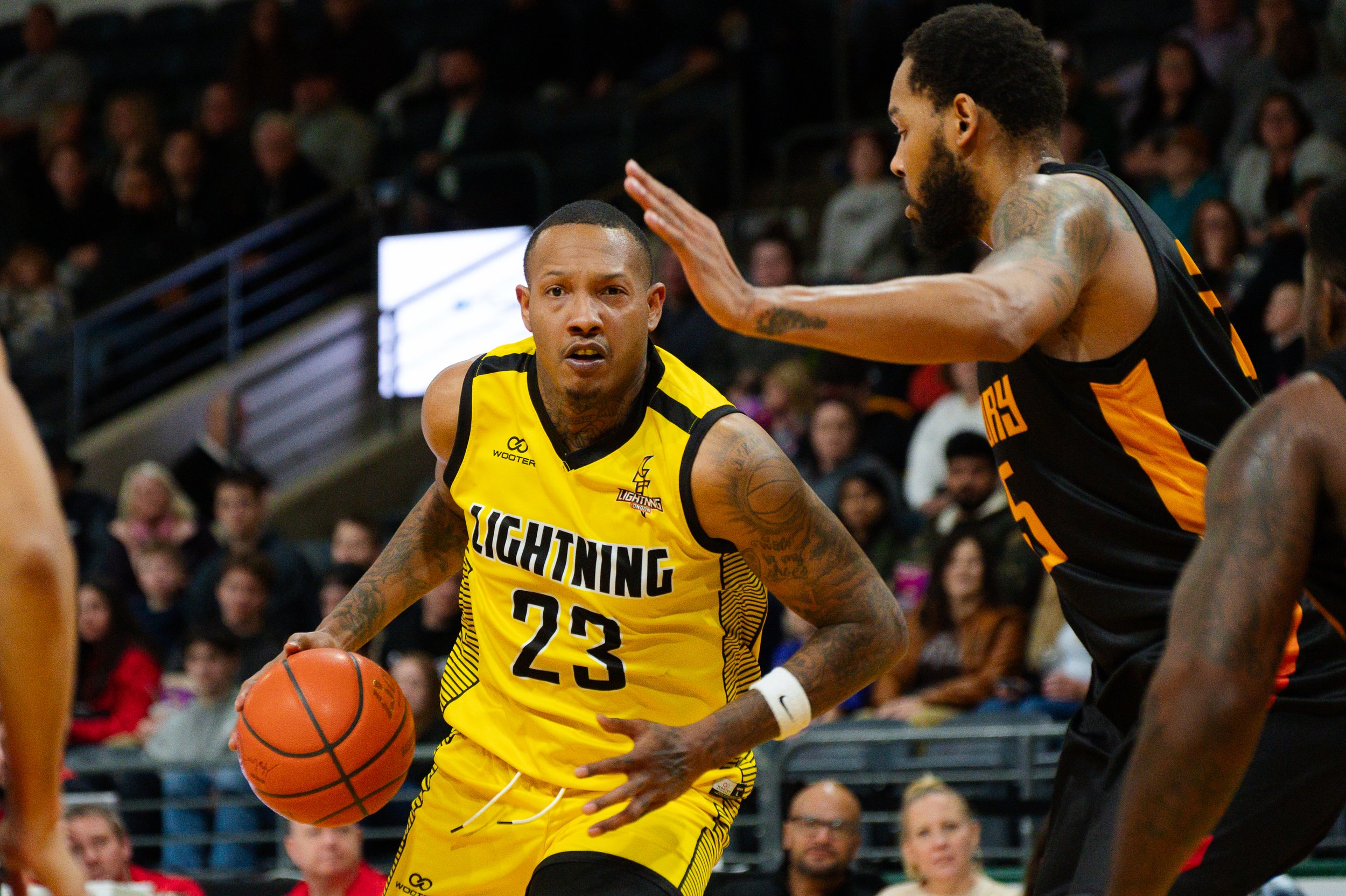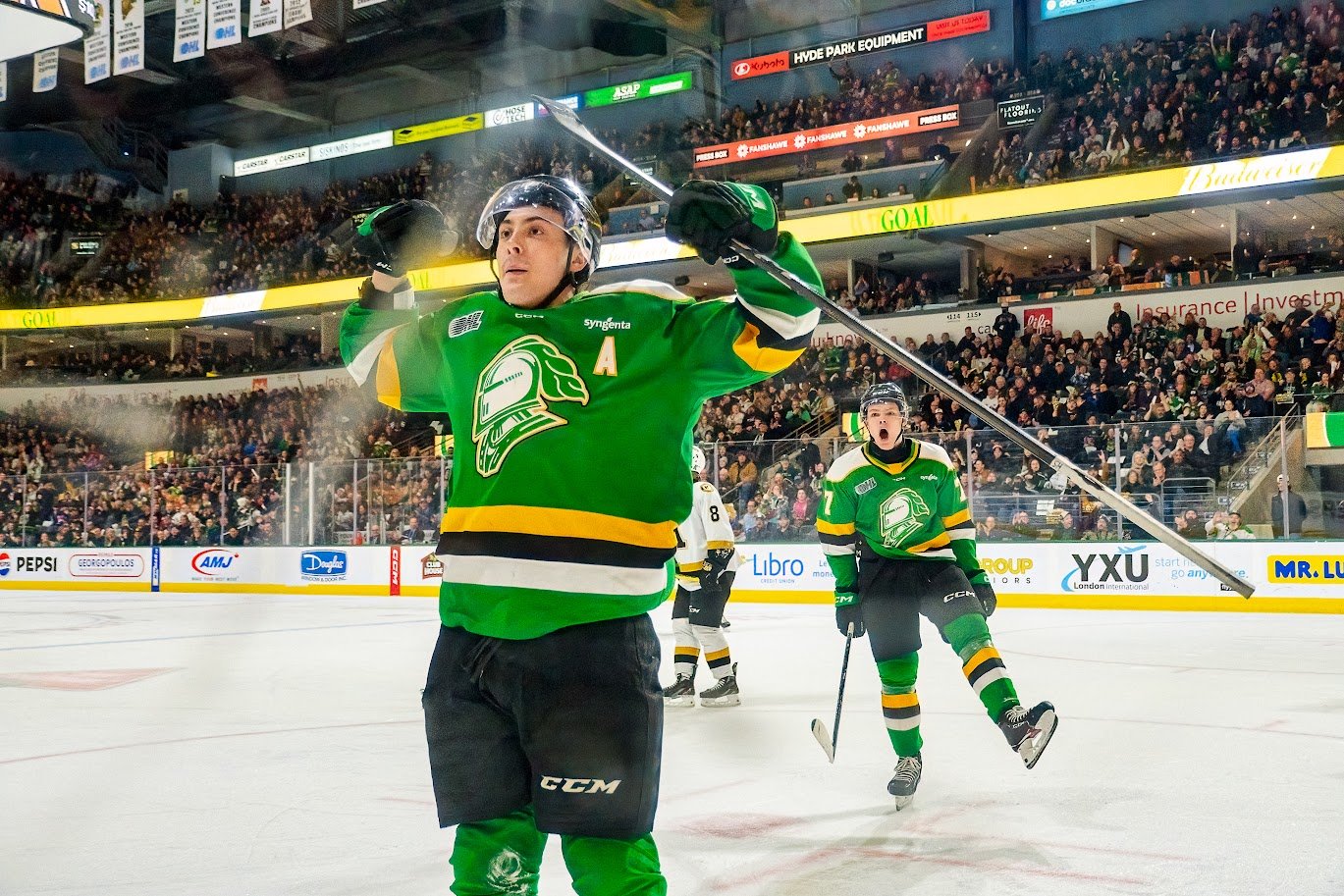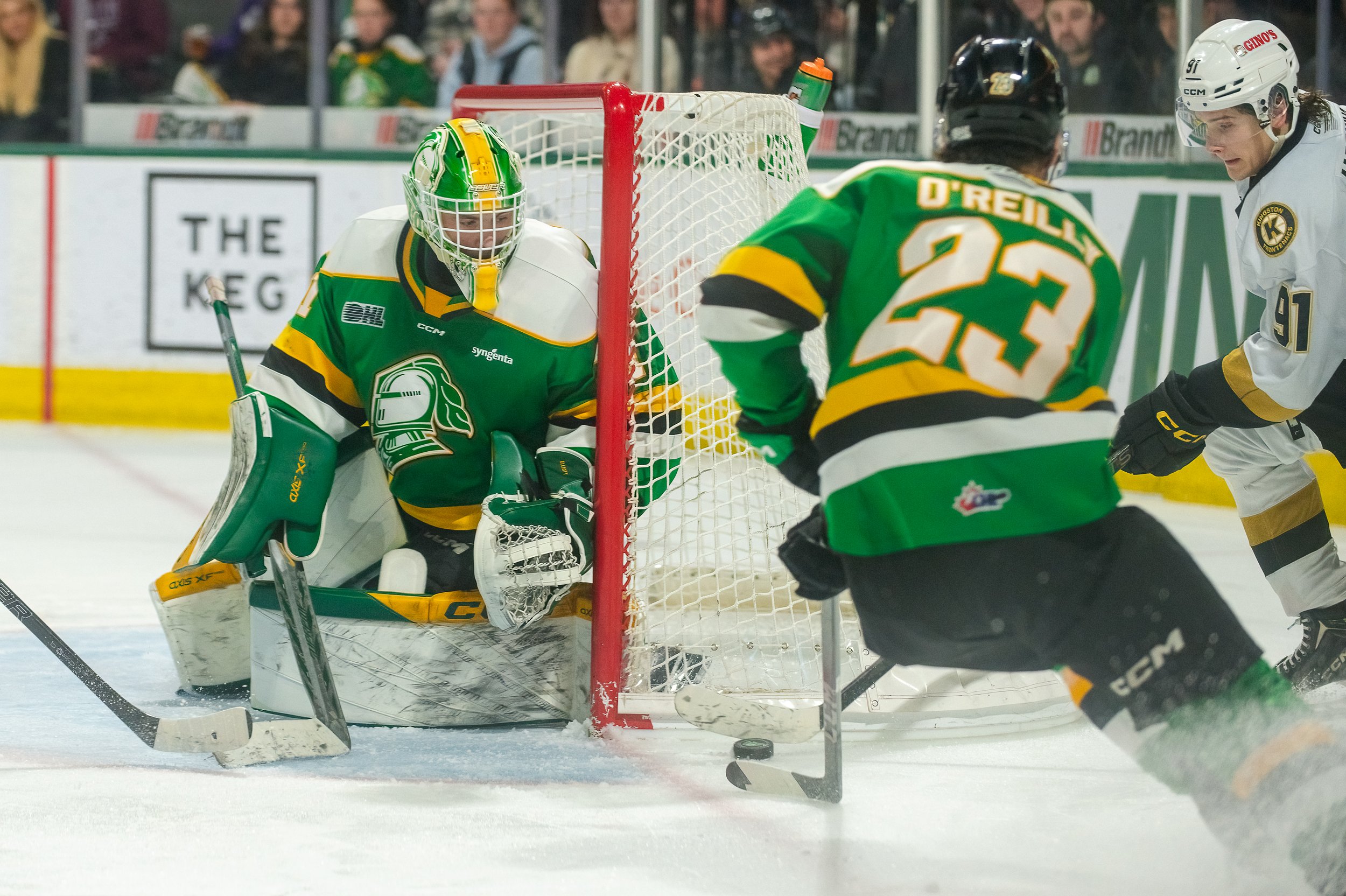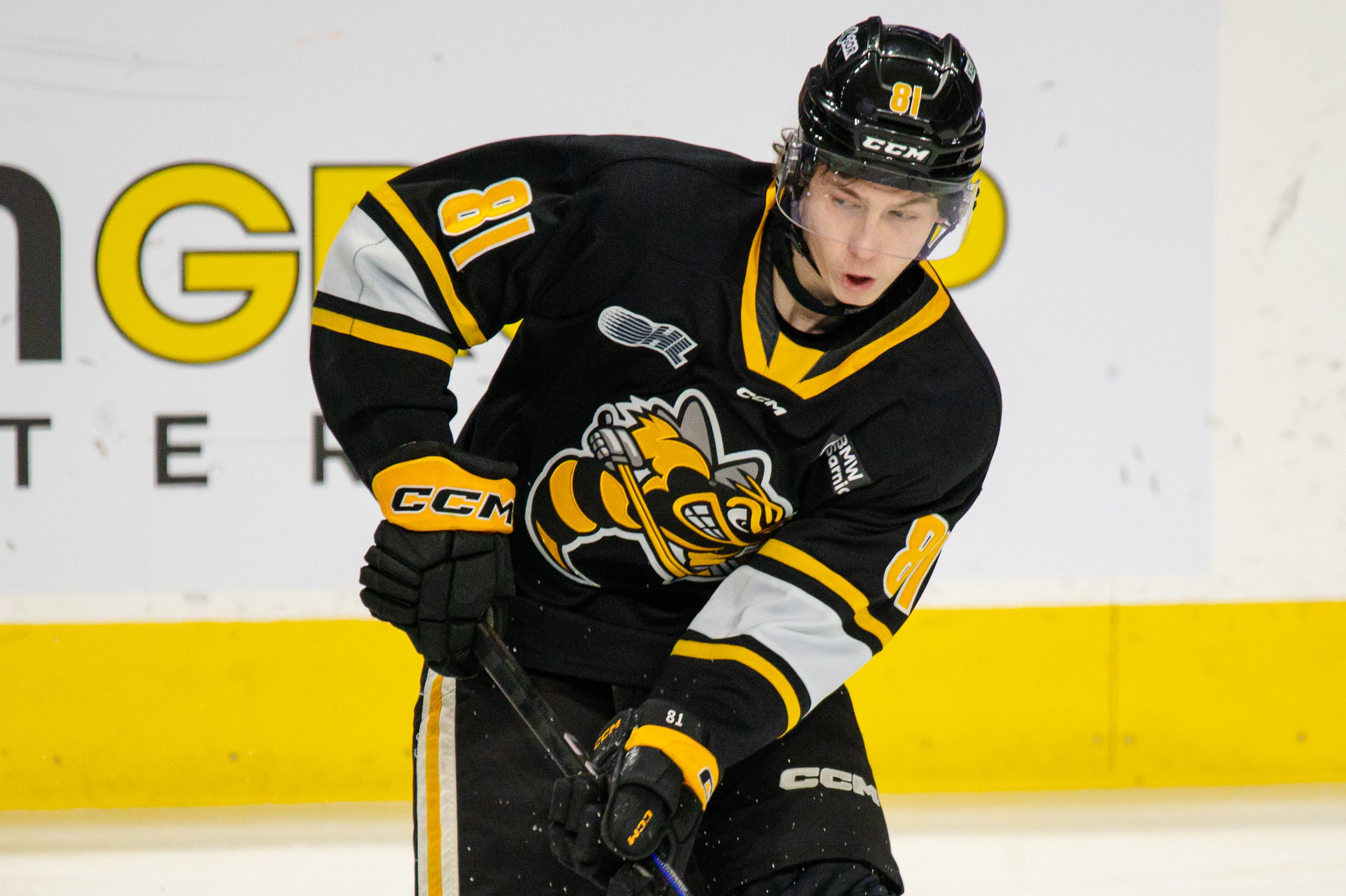Brownlee, not done yet, committed to community
He turns 40 this season, but Cleveland Brownlee is still competing. He wants to leave a legacy on the field — and in the community that welcomed him with open arms 15 years ago.
(Photo: Matt Hiscox Photography).
* * *
Don’t let that big smile and booming personality obscure the heart of a fierce competitor who’s proud of every number over his last 15 seasons: 642 hits. 135 home runs. 516 RBIs. Two championships. And counting.
But ask Cleveland Brownlee his favourite number, the one that matters most, the one he hopes Londoners remember long after his final swing, and he’ll point to a number that doesn’t appear on the back of a baseball card: Lives touched.
“I want to help people. I want to see much-needed changes made to take this community to the next level. Sports is a great place to start,” the London Majors veteran said. “The next great superstar is out there right now – we just haven’t reached out to those communities and offered the opportunity.”
He continued, “I want to leave a legacy where people can say ‘Cleveland made a difference – he changed something for the better.’”
* * *
The Brownlees have always loved the ballpark. Cleveland’s dad played the game as a younger man, and if you ask around the right corners of the Peach State today, there are still plenty of stories about how far dad could slug a ball. Those barnstorming leagues took him all over the state, where everywhere from parishes to prisons fielded a team.
“‘You can hit,’ people still say to me, ‘but you can’t hit like your dad!’” Brownlee laughed. “My dad is a big boy, too. He always says, ‘You might hit the ball farther than me, but I was more disciplined. I hit for average, too. You let too many go by.’”
The younger Brownlee got serious about the game in high school, then continued at Clark Atlanta University, where he earned a Bachelor’s in Business Administration (Marketing). There, he starred for the Panthers, setting numerous records, including home runs.
If you know anything about U.S. college baseball, there is one big difference to the sound of the game versus what you hear on summer nights at Labatt Park. In U.S. college ball, there’s a certain ‘ting’ that comes from aluminum bats striking a baseball – and then a sizzle of the ball cutting through the air off the bat. His teammates even modified bats by riding their cars over the barrels to flatten one side to create more surface area for contact.
As you might guess, Brownlee was deadly with an aluminum bat in his hands – a loaded rocket launcher aimed back at a pitcher standing 60-feet-6-inches away.
“We punished pitchers,” Brownlee said. “I still remember some kids wearing mouth guards and chest protectors when they faced use. We punished them.”
(Photo: Wild Ave Photography)
Right out of college, Brownlee thought his numbers were good enough to play at the highest levels. He faced big schools, with big arms, and he killed them all. He was in the best shape of his life. He was big, could crush a baseball, and fly around the basepaths.
That talent led to open tryouts and invitation-only camps, often in front of Major League scouts. Time after time, however, the same story played out. He survived early rounds, only to be cut in the final stage.
Despite his talent, the 6-foot-4 Brownlee had difficult standing out in a crowded field.
“It seemed the MVP of every team either played first base or left field – my positions. So, when I had an opportunity to play, I had better show up big time,” he said. “I knew I was on the cusp of making it, but I didn’t have that training to get me over to that next level.”
Part of that training involved a certain intangible that started off the field and then carried on. He noticed the players who made the cut carried themselves differently, paid attention to how they prepared, how they looked, how they conducted themselves.
“Coming from a DII school, and then going into spring training with the Phillies, that was ball I had never seen. I had seen it on TV, but to face it in real life, I wasn’t mentally ready,” Brownlee explained.
“Those guys understood the game. They carried themselves better than I could. That was an adjustment I learned to make quickly. You had to look the part, dress the part, present yourself in a way so that people respect you. You had to have that swagger about you, so people know you’re about business.”
These are lessons that have stuck with him his entire career, and ones he imparts to young players he coaches today. It’s the leg up he never had.
“I teach young kids now to walk out on that field looking like you’re ready to play. Show them you mean business.”
As the years played out, Brownlee continued to push through, bouncing around, playing ball, nabbing any tryouts he could find. He worked out with different training centres and heeded the advice of hitting gurus. He crossed paths with some of the game’s best hitters, including Atlanta hometown heroes Marquis Grissom and Jason Heyward, who at the time was a high school phenom recently drafted by the Atlanta Braves.
At every stop, Brownlee continued to slug, but he never made contact with that one opportunity to play at a higher level.
(Photo: Wild Ave Photography).
* * *
By 2010, the basepaths were loaded with frustration.
Released by yet another team in Georgia, Brownlee had all but given up on the game – throwing away his gear and going to work with his retired steelworker father who still spent time on remodeling projects. Then, a stranger called.
“I heard you played ball,” the caller said. “I heard you are pretty good and that you just need a good shot at it.”
Brownlee wasn’t buying it. He was certain it was a prank – a friend having a little fun on the other end of the line.
“I’m an agent, and I’m just getting started,” the caller continued. “It will cost you $300 …”
“I don’t have $300,” Brownlee interrupted.
“Listen,” the caller continued, “if I find you a place to play, will you promise to give me $300?”
Brownlee agreed. A few hours later, the agent rang again. He had an offer. “Do you want to go to London to play baseball?”
There was silence on both sides of the line.
You can’t blame an Atlanta guy for being confused.
Not England. London, Ontario. Yes, the streets and attractions are named the same as in the UK. But this one is in Canada. The one with a university named Western Ontario that sits in the province’s southeast corner.
“It took me two days to figure out it’s a real place,” Brownlee laughed.
Nevertheless, it was a new opportunity with a new team – and he knew there wouldn’t be many more of those.
“I had been released so many times that I was nervous,” Brownlee said. “London was an opportunity for me to go and see something different. I had it in my mind that this could be my last shot in baseball. So, why not give it all I got. I was like, ‘Let’s give it a shot!’”
Almost as soon as the ink dried on his import player contract, Brownlee’s hitting prowess was apparent. That season, he hit nine home runs and drove in 24.
The following year, he laid the groundwork for a legendary Intercounty Baseball League career, batting .387 with 38 RBIs. Over the next two years, he mashed a combined 25 homers, hitting .369 in the latter season – with a league-best 50 RBIs in 40 games.
“The Majors opened their doors to me and gave me an opportunity to showcase something. I didn’t have that kind of shot at other places. I came here, worked on my craft, and started having fun again. I enjoyed the game – and people cheered for me. It was a new way of life for me to come to Canada.”
It was also a new opportunity for his family back in Georgia.
“My parents would’ve never come to Canada if not for me. My friends would never have seen pictures of Niagara Falls or places like that if not for me. That was a game-changer for me. I can do something different for my family. That’s what kept me motivated to keep going,” Brownlee said.
“I carry my family on my shoulders. My grandfather, my grandmother, they never saw Canada. So, I carry that name on my back. The Brownlee name is in Canada now.”
(Photo: Wild Ave Photography)
* * *
From 2010 to 2013, Brownlee traveled back home to Georgia after each season, but he was open to the possibilities in making the Forest City home.
“I wanted a change in life. I looked at London as a place that opened its arms up to me. I had that drive about myself. I didn’t mind working. So, if you give me a shot, I’m going to do it. I came here and wanted to change my life for the better.”
The difference-maker was landing a job with Try Recycling and Miller Waste Systems. That provided the work visa that allowed him to put down roots.
“They took a bet on me. So, I made a bet on London.”
In 2014, London became home. Brownlee was earning enough money to build a life. He purchased his first car in his own name and paid for tickets to fly his family north to visit. It was also an opportunity to do something for a community he never saw growing up.
“Community is important to me. Not a lot of people came back to my community after they left,” said Brownlee, who now works as general manager of The Better Bin Company. “They made money, and they got out of there. They would ship a little money back here and there, but they didn’t come back. We didn’t see them walking around or giving back their time. That was something I didn’t want to do.”
London is not only home, not only a place where he has built a family, but it is also a place where he wants to make a difference. There are causes close to his heart – the London Abused Women’s Centre, for example. But he wants to do more.
“I want to leave a legacy here. I want to be able to say I came and created something different. London has so many opportunities that we’re missing out on because nobody has done anything different with it. We’re just living with what’s here and we’re going to ride with it. That’s not OK with me.”
Part of that outreach involves finding kids like him. They are out there, Brownlee knows.
“I’ve been that kid struggling, that kid who didn’t have anything, or who had to wait and see if you could get new school shoes, or who was scared to ask for a toy. I’ve seen those late notices on your door. I wanted to be that person in the community who could help.”
Despite the overwhelming need, he hears from community and school leaders about the difficulty of connecting. He recounts a conversation with a principal having trouble connecting with kids.
“I told her I can give you one reason why – you don’t look like them. You’re not giving them belief that they can make it out of here. They see another person coming in and telling them things. You need to have somebody in there who looks like them to say to them, ‘Hey, I came from a community like this. I know what you’re going through. Let me help you.’”
For Brownlee, he knows sport is a way out. That’s why he volunteers each summer with Rookie League, a six-week baseball camp for kids in underprivileged areas to learn the game, sponsored by the Majors, the London Police Service, London Middlesex Community Housing, and Joe Kools.
“Maybe there are great athletes just hidden because their parents don’t have the money to put them into sports. They have never been outside of East London or something like that because parents can’t take them out there. They don’t know any better. I want to expose them to the other side of places – and sports is a great place to start.”
For Brownlee, that commitment to serve the community spills onto the field every game, whether on the field, in the dugout, or meeting with fans after the game. He sees his status as a Major as a responsibility, first and foremost.
“It’s a privilege to play in this city, in that park, with a jersey with my name on the back,” he said. “I try and put on a show for the fans. They want to see somebody with passion and heart. That’s what I do. I play every inning to my fullest. These kids in the stands are looking at us. They’re watching our every move to see what we do, how we play, how we react to different things on the field. You gotta go out there with a smile on your face. Some kids will never be able to walk, or hit a ball, or throw a ball, so you gotta do it for those kids.”
(Photo: Matt Hiscox Photography).
* * *
Now in his 15th season, Brownlee doesn’t mind wearing a new hat in addition to the navy blue Majors cap. No longer an every game player, he has settled into a new role as mentor for younger players.
“I am the guy they come to if they need to talk about anything – from baseball to life. I have accepted that. I can lay out a road map for them to succeed – go out and hustle, play hard, sign autographs, take as many pictures with kids as you possibly can. People pay that money. You never know if this is that one summer thing a kid gets to do for fun. Everyone cannot afford a Jays game.”
He continued, “Make it enjoyable for them. You’re on that field for nine innings. Give it your all that night. Whether you had the best game, or you had the worst game, put a smile on your face as you walk off that field and show those kids that you’re giving the best you can.”
Brownlee might be retired from the game already if not for an injury – a broken hand – that limited him to one at-bat in the playoffs last season. That injury last year left him with a lot of ‘what if’s’.
“I felt like I let the team down. I left too much on the table. When you talk about retiring, I was ready. I talked to (Majors co-owner and manager Roop Chanderdat). We talked for a while. I told him, ‘I’m done. I’m done.’ I had a great career. I proved everything I wanted to prove to everybody.
“Now, I have it in my mind for one last shot. My son is at that age where he loves this game. He’s at every practice, almost every game. Let me show him dad can still compete. Plus, there’s just a couple things on my chest that I need to get off to say, ‘Yes, I am 40 years old, but I am going to compete, and I am going to show you I can still compete before I walk away.’”


















Knight Watch: London has won eight straight to open playoffs. Can they continue momentum against Kitchener Rangers?; Star goalie Jackson Parsons gives Kitchener a chance. Columnist Jake Jeffrey previews the matchup …